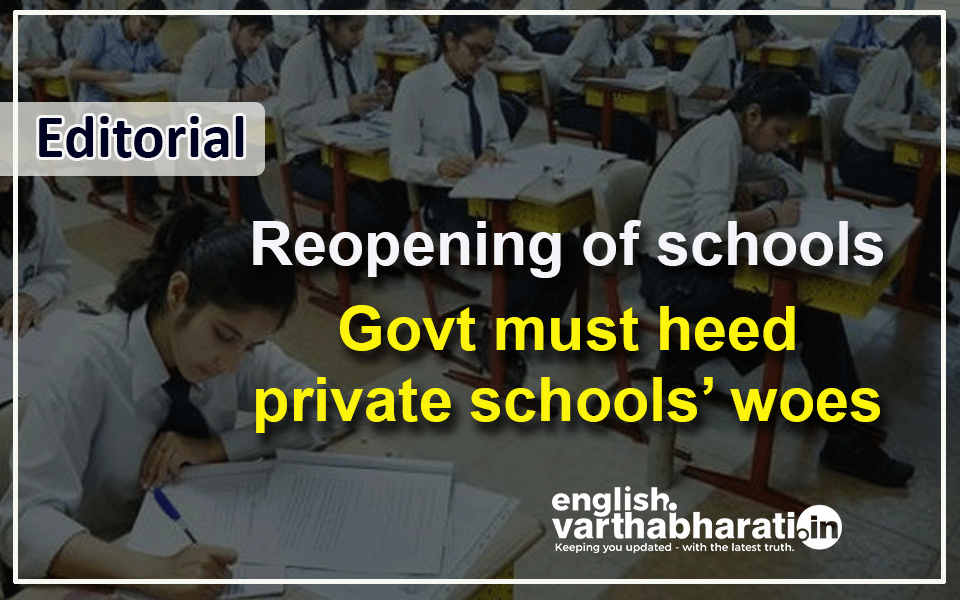Although the state government has indicated that academic activities would start only in August in view of the Corona pandemic, it has not yet issued clear orders or guidelines. The Government seems to be adopting a cautious approach against any eventuality that might arise over its decision and is shifting the entire responsibility to the school managements. The government is insisting that schools must collect the views of parents about reopening of schools but there is no clarity on resolving the issue in case the parents are not unanimous in their opinion. The government seems to be wanting to have the cake and eat it too - it wants schools to reopen but is not prepared to face repercussions.
This along with the government’s lack of clarity on conducting online classes seems to be the reason why it is sending confusing signals. Recently two senior ministers issued contradictory statements on online classes confounding the confusion. While Law Minister J.C.Madhu Swamy has said that state cabinet has decided to ban online classes from LKG to seventh standard, Education Minister S. Suresh Kumar has stated that online classes will be disallowed only up to fifth standard.
In any case, the government seems to be taking a hasty decision on online classes despite being aware of the fact that more than 25 lakh children have no access to smart phones. The government also has no clarity about the alternative arrangements for those who cannot participate in online classes. In the absence of such arrangements, online education is bound to lead to discrimination. Poor children who cannot access online classes might also experience depression. The government should study the impact of the social divide and the digital divide that online education will create and disallow online education till SSLC. A hasty decision will deprive a substantial number of students of education.
In the midst of all this confusion, private schools are stuck in a quandary. It’s a wrong notion that all private schools are set up with the sole intention to make profit. Many private schools are set up to spread education with a service motto and their role in spreading education cannot be undermined. Not just in Karnataka, private institutions all over the country have created an educational revolution by imparting education on a large scale much before the government woke up. While Christian institutions were the pioneers, other private organizations eventually adopted the same model. Private schools must also be credited for providing education to the poor. When an increasing number of government schools are closing down, private schools are effectively filling the gap and are serving the public by charging reasonable fees. Such schools are now facing the brunt of the government’s confusion. The government should immediately listen to the woes of these mid-size private schools and, for the moment, keep the ‘five-star’ schools aside.
In the present circumstances, the government has two options. First, it should issue clear directions to schools about resuming academic activities instead of creating confusion and repose confidence in them. Even if it decides to reopen schools by August or September, it should provide clear guidelines. Second, if the government decides schools should not reopen this year, it should address the concerns of these private schools. While such a decision will not impact the rich schools, the schools that depend on the middle classes for survival will suffer a lot. One of the most significant problems before these schools that don’t receive any financial aid from the government would be the payment of salaries of staff. If these schools are shut for a year, the fate of their employees would be precarious and many of them would find it difficult to sustain. If the government assures such schools that it would provide at least half the salaries to employees, these schools might survive for at least a year. Otherwise, many schools might be forced to close down or it might become inevitable for teachers and staff to forego their salaries. In such a situation, the government must respond and step in to address the problem of these staff members.
But the most important task before the government now is to resolve the confusion that it has created by issuing contradictory statements and take a firm decision. The state cannot view health and education separately – one is related to the body and another is related to the mind. Both have a bearing on building a society. Our education minister should also adopt a reasonable stand towards the private schools that are working along with government schools to provide education as a service.
Let the Truth be known. If you read VB and like VB, please be a VB Supporter and Help us deliver the Truth to one and all.
Kalaburagi: Four men have been arrested in Kalaburagi on charge of hacking a man with lethal weapons and pelting stones at him under the limits of Station Bazaar Police Station recently.
According to police sources, Anand Jalak Shinde (34), Ashitosh Jalak Shinde (30), Imran Mehboob Sheikh (28) and Sohaib Anwar Qureshi have been arrested. The men are accused of the brutal murder of Syed Mehboob, a resident of Station Bazaar Upper Line Hamalawadi in the city.
An FIR was filed by the Station Bazaar Police Station based on a complaint given by Syed Ismail, father of the deceased Syed Mehboob.
Following quick probe, the police team successfully arrested the suspects within 24 hours. The arrested men were produced in court and have been sent to judicial custody.
The City Police Commissionerate has appreciated in an official release the police team’s quick solving of the murder case and arrest of the four men accused of murdering Syed Mehboob.





